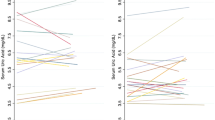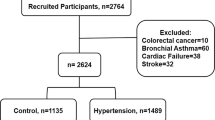Abstract
Elevated C-reactive protein (CRP) levels have been associated with increased cardiovascular risk in hypertensive adults. The aim of this study was to determine whether plasma CRP level is more predictive of left ventricular hypertrophy (LVH) than is ambulatory blood pressure (BP) in hypertensive children. Baseline and 12-month follow-up measures of BP, body mass index (BMI), low-density lipoprotein/high density lipoprotein cholesterol, left ventricular mass (LVM), and CRP data collected from 48 newly diagnosed, untreated hypertensive children were analyzed. CRP was measured by a highly sensitive nephelometric method. Left ventricular mass index (LVMI) was calculated as LVM/height2.7, and LVH was defined as LVMI >38.6 g/m2.7 being the cut-point for the 95th percentile found in healthy children. Average systolic BP (SBP), diastolic BP (DBP), SBP index, and DBP index were calculated. All patients received hydrochlorothiazide therapy in combination with angiotensin converting enzyme inhibitor treatment. Five patients also had angiotensin receptor blocker therapy to reach the target BP (<95th percentile corrected for age and gender). In a multiple regression analysis, LMVI was correlated with CRP, BMI, SBP, and SBP index. CRP alone explained 77% of the variance of LVMI, whereas BMI, SBP, and SBP index explained only 1.3, 0.3, and 0.4% of the variance, respectively. CRP was also the most significant correlate of follow-up LVH. In conclusion, elevated CRP level is significantly associated with LVH in children with essential hypertension. BP reduction with renin–angiotensin system blocker and hydrochlorothiazide therapy reduces LVH while lowering CRP level.
Similar content being viewed by others
References
Assadi F (2007) Effect of microalbuminuria-lowering on regression of left ventricular hypertrophy in children and adolescents with essential hypertension. Pediatr Cardiol 28:27–33
Asselbergs FW, Diercks FH, Hillege HL, et al. (2004) Effects of fosinopril and pravastatin on cardiovascular events in microalbuminuric subjects: Results of the PREVEND IT. Circulation 110:2809–2816
Blake GJ, Ridker PM (2003) C-reactive protein and other inflammatory risk markers in acute coronary syndromes. J Am Coll Cardiol 41:372
Brasier AR, Recinos A, Eledrisi MS (2002) Vascular inflammation and the renin–angiotensin system. Arterioscler Thromb Vasc Biol 22:1257–1266
Briars GL, Bailey BG (1994) Surface area estimation: Pocket calculator versus nomogram. Arch Dis Child 70:246–247
Daniels SR, Loggie JM, Khoury P, Kimball TR (1998) Left ventricular geometry and severe left ventricular hypertrophy in children and adolescents with essential hypertension. Circulation 97:1907–1911
de Simone G, Daniels SR, Devereux RB, et al. (1992) Left ventricular mass and body size in normotensive children and adults: assessment of allometric relations and impact of overweight. J Am Coll Cardiol 20:1251–1260
de Simone G, Devereux RB, Daniels SR, et al. (1995) Effect of growth on variability of left ventricular mass. Assessment of allometric signals in adults and children and their capacity to predict cardiovascular risk. J Am Coll Cardiol 25:1056–1062
Devaraj S, Xu DY, Jialal I (2003) C-reactive protein increases plasminogen activator inhibitor-1 expression and activity in human aortic endothelial cells: implications for the metabolic syndrome and atherothrombosis. Circulation 107:398–404
Devereux RB, Alonso DR, Lutas EM, et al. (1986) Echocardiograph assessment of left ventricular hypertrophy: comparison to necroscopy findings. Am J Cardiol 75:450–458
Herbert LA, Wilmer WA, Falkenhain ME, et al. (2001) Renoprotection: one or many therapies? Kidney Int 59:1211–1226
Lande MB, Carson NL, Roy J, Meagher CC (2006) Effect of childhood primary hypertension on carotid initma media thickness: a matched controlled study. Hypertension 48:40–44
Litwin M, Niemirska A, Sladowska J, et al. (2006) Left ventricular hypertrophy and arterial wall thickening in children with essential hypertension. Pediatr Nephrol 21:811–819
Mattman A, Eintracht S, Mock T, et al. (2006) Estimating pediatric glomerular filtration rates in the era of chronic kidney disease staging. J Am Soc Nephrol 17:485–496
National High Blood Pressure Education Program Working Group on High Blood Pressure in Children and Adolescents (2004) The fourth report on the diagnosis, evaluation, and treatment of high blood pressure in children and adolescents. Pediatrics 114:555–576
Ogden CL, Kuczmarski RJ, Flegal KM, et al. (2002) Centers for Disease Control and Prevention 2000 growth charts for the United States: improvements to the 1977 National Center for Health Statistics version. Pediatrics 109:45–60
Pia Jk, Pischon T, Ma J, et al. (2004) Inflammatory markers and the risk of coronary heart disease in men and women. N Engl J Med 351:2599–2610
Ramaswamy P, Lytrivi ID, Paul C, Golden M, Kupferman JC (2006) Regression of left ventricular hypertrophy in children with antihypertensive therapy. Pediatric Nephrol 22:141–143
Ridker PM (2001) High-sensitivity C-reactive protein: potential adjunct for global risk assessment in the primary prevention of cardiovascular disease. Circulation 103:1813–1818
Ridker PM, Hennekens CH, Buring JE, Rifai N (2000) C-reactive protein and other markers of inflammation in the prediction of cardiovascular disease in women. N Engl J Med 342:836–843
Rutter MK, Meigs JB, Sullivan LM, D’Agostina RB Sr, Wilson PW (2004) C-reactive protein, the metabolic syndrome, and prediction of cardiovascular events in the Framingham Offspring Study. Circulation 110:380–385
Schillaci G, Pirro M, Gemelli F, et al. (2003) Increased C-reactive protein concentrations in never-treated hypertension: the role of systolic and pulse pressures. J Hypertens 21:1841–1846
Schwartz GJ, Haycock GB, Edelmann CM Jr, Spitzer A (1976) Predicting glomerular filtration rate in children derived from body length and plasma creatinine. Pediatrics 106:522–526
Sorof JM, Cardwell G, Portman RJ (2002) Ambulatory blood pressure and left ventricular mass index in hypertensive children. Hypertension 39:903–908
Verma S, Li SH, Badiwala MV, et al. (2002) Endothelin antagonism and interleukin-6 inhibition attenuate the proatherogenic effects of C-reactive protein. Circulation 105:1890–1896
Verma S, Wang CH, Li SH, et al. (2002) A self-fulfilling prophecy: C-reactive protein attenuates nitric oxide production and inhibits angiogenesis. Circulation 106:913–919
Viberti G, Wheeldon NM (2002) Microalbuminuria reduction with valsartan in patients with type 2 diabetes mellitus: a blood pressure independent effect. Circulation 106:672–678
Wang CH, Li SH, Weisel RD, et al. (2003) C-reactive protein upgrades angiotensin type 1 receptors in vascular smooth muscle. Circulation 107:1783–1790
Acknowledgments
The author thanks John Bokowski for assistance in performing the two-dimensional directed M-mode echocardiography. The author is also grateful to the following people for their contribution to the study: Omid Rouhi, Ira Shetty, Barbara A. Santucci, Allen R. Wendt, Bridget L. Voigt, Beth A. Volin, Sara Verghese, Gary R. Strokosch, William B. Stratbucker, Rita M. Rossi-Foulkes, Jeffrey M. Mjaanes, Stephanie L. Luther, Jane E. Kramer, Karen R. Judy, Cathy Lynn A. Joyce, Cynthia M. Hoess, Erin A. Flanagan-Klygis, and Carrie L. Drazba.
Author information
Authors and Affiliations
Corresponding author
Rights and permissions
About this article
Cite this article
Assadi, F. C-Reactive Protein and Incident Left Ventricular Hypertrophy in Essential Hypertension. Pediatr Cardiol 28, 280–285 (2007). https://doi.org/10.1007/s00246-006-0173-2
Received:
Accepted:
Published:
Issue Date:
DOI: https://doi.org/10.1007/s00246-006-0173-2




